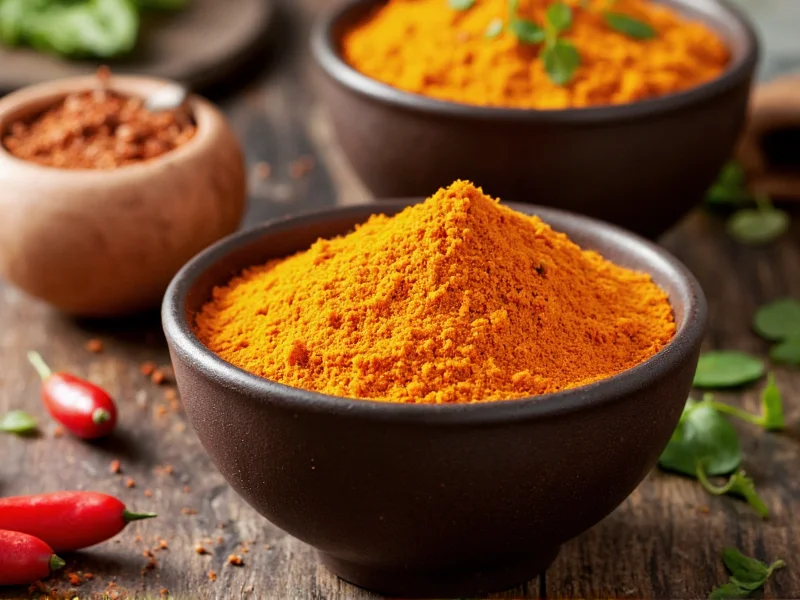Curry spice isn't a single ingredient but a blend typically containing turmeric, coriander, cumin, fenugreek, and chili peppers. The health effects primarily come from these individual components, with turmeric's curcumin being the most extensively studied. Research shows these spices contain potent antioxidants and anti-inflammatory compounds that may support heart health, brain function, and digestion when consumed as part of a balanced diet.
The Science Behind Curry Spice Health Benefits
Curry spice blends derive their health properties from multiple bioactive compounds working synergistically. Turmeric provides curcumin, which numerous studies link to reduced inflammation markers. Cumin contains cuminaldehyde that may support digestive health, while coriander offers linoleic acid associated with cholesterol management. This combination creates what researchers call the "food synergy" effect—where the whole blend provides greater benefits than isolated components.
| Primary Component | Key Compound | Research-Supported Benefits | Recommended Daily Amount |
|---|---|---|---|
| Turmeric | Curcumin | Reduces inflammation markers, supports joint health | 500-2,000 mg |
| Cumin | Cuminaldehyde | Improves digestion, may regulate blood sugar | 300-600 mg |
| Coriander | Linoleic acid | Supports cholesterol management, antioxidant effects | 10-30 g seeds |
| Fenugreek | Diosgenin | May improve insulin sensitivity, supports lactation | 500-1,000 mg |
Evidence-Based Health Benefits of Curry Spice
Multiple clinical studies demonstrate curry spice components offer significant health advantages. A 2022 meta-analysis published in Nutrients found that regular turmeric consumption reduced inflammatory markers like C-reactive protein by 15-20% in participants with metabolic syndrome. Another study in the Journal of Medicinal Food showed that curry spice blends improved antioxidant status more effectively than individual spices alone.
Research on curry spice and cognitive health shows promising results. A longitudinal study tracking elderly populations in India found those consuming curry regularly had better cognitive scores, though researchers caution this correlation doesn't prove causation. The anti-inflammatory properties may help protect against neurodegenerative conditions by reducing oxidative stress in brain tissue.
Potential Concerns and Limitations
While generally safe, curry spice may cause issues for some individuals. High doses of turmeric (over 8 grams daily) can cause gastrointestinal discomfort in sensitive people. Those taking blood thinners should consult their doctor before consuming large amounts of curry spice, as curcumin may enhance anticoagulant effects. People with gallbladder issues should moderate intake as spices can stimulate bile production.
It's important to distinguish between culinary curry spice and concentrated supplements. Most research on significant health effects uses standardized curcumin extracts with piperine (from black pepper) to enhance absorption. The amounts typically used in cooking provide more modest benefits but contribute to overall dietary quality when used regularly.
Maximizing Health Benefits in Your Diet
To get the most from curry spice, combine it with healthy fats and black pepper. Curcumin is fat-soluble and its absorption increases by 2,000% when paired with piperine. Try adding curry spice to olive oil-based dressings, roasted vegetables, or lentil dishes. For optimal benefits, aim for regular moderate consumption rather than occasional large doses—about 1-2 teaspoons daily in cooking provides meaningful amounts of beneficial compounds without risk of side effects.
When selecting curry spice, choose fresh blends from reputable sources. Ground spices lose potency over time, so check for production dates and store in airtight containers away from light. Making your own blend from whole spices you toast and grind ensures maximum freshness and control over ingredients.
Curry Spice Compared to Other Health-Promoting Spices
While curry spice offers unique benefits, it works best as part of a diverse spice regimen. Ginger provides different anti-inflammatory compounds, garlic offers allicin for cardiovascular health, and cinnamon helps regulate blood sugar. The most healthful approach incorporates multiple spices rather than relying on any single one. Research shows varied spice consumption creates a broader spectrum of protective phytochemicals in the diet.
Practical Recommendations
For most adults, incorporating curry spice into regular cooking provides safe, modest health benefits. Start with smaller amounts if you're new to spicy foods and gradually increase as your tolerance develops. Pair curry dishes with vitamin C-rich foods like tomatoes or citrus to further enhance nutrient absorption. Remember that curry spice complements but doesn't replace medical treatment for serious health conditions—view it as part of an overall healthy lifestyle rather than a cure-all solution.











 浙公网安备
33010002000092号
浙公网安备
33010002000092号 浙B2-20120091-4
浙B2-20120091-4